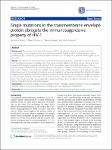Single mutations in the transmembrane envelope protein abrogate the immunosuppressive property of HIV-1
Morozov, Vladimir
Morozov, Alexey V.
Semaan, Marwan
Denner, Joachim
Background: The mechanism by which HIV-1 induces AIDS is still unknown. Previously, synthetic peptides corresponding to the conserved immunosuppressive (isu) domain in gp41 of HIV-1 had been shown to inhibit proliferation and to modulate cytokine expression of immune cells. The question is, whether the viral gp41 can do the same. Results: We show for the first time that two trimeric forms of glycosylated gp41 released from transfected human cells modulated expression of cytokines and other genes in human PBMCs in the same manner, but at least seven hundred-fold stronger compared to that induced by the isu peptide. Single amino acid substitutions in the isu domain of gp41 introduced by site-directed mutagenesis abrogated this property. Furthermore, replication-competent HIV-1 with a mutation in the isu domain of gp41 did not modulate the cytokine expression, while wild-type virus did. Interestingly, most of the abrogating mutations were not reported in viral sequences derived from infected individuals, suggesting that mutated non-immunosuppressive viruses were eliminated by immune responses. Finally, immunisation of rats with gp41 mutated in the isu domain resulted in increased antibody responses compared with the non-mutated gp41. These results show that non-mutated gp41 is immunosuppressive in immunisation experiments, i.e. in vivo, and this has implications for the vaccine development. Conclusions: These findings indicate that the isu domain of gp41 modulates cytokine expression in vitro and suppresses antibody response in vivo and therefore may contribute to the virus induced immunodeficiency.
No license information

